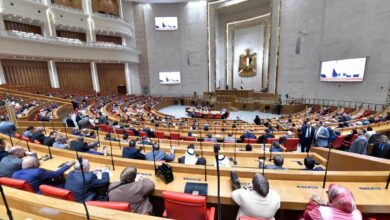In 1993, Ashraf el-Hefny got his first job as a mathematics teacher at a public school in the coastal city of El-Arish earning LE150 a month. Over the course of 17 years, his pay gradually increased to a current LE1150.
But the salary increases failed to keep pace with rising inflation rates, which have hit unprecedented levels in recent years, and his current income barely suffices for the everyday needs of his family of five.
“It’s not enough,” the teacher complained. “These low salaries show that the state doesn’t care about education.”
For el-Hefny, finding an efficient channel through which to voice his claim to a reasonable salary represents the biggest challenge. And, like thousands of other teachers, he found little succor in the government-dominated teachers union.
Frustrated with the union’s ineffectiveness, el-Hefny, along with hundreds of colleagues, last week announced the establishment of an independent teachers syndicate.
“It’s very important to have this syndicate,” he said. “The existing union is pro-government, and it’s crucial for any professional group to have a union that is capable of defending its rights.”
The new syndicate’s founders claim to have attracted 5000 of Egypt’s roughly one million teachers. The by-laws of the new syndicate demand a minimum wage of LE1200, the improvement of working conditions in public schools and the amendment of Egypt’s education law.
“Teachers have no offices at the schools where they teach,” said el-Hefny. “They are often forced to wait for their classes in playgrounds or in hallways.”
“Also, class conditions are very poor, with as many as 80 or 90 students in each class,” he added. “This is unfair to both teachers and students.”
The establishment of the new union represents the latest episode of a teachers’ protest movement that first began in 2007, triggered by the amendment of Egypt’s education law. By giving the government more leeway to hire and fire newly appointed teachers, the amendment served to antagonize thousands of the nation’s already frustrated teachers.
“The amendment made teachers feel they were being subject to serious humiliation,” said Kamal Mogheeth, a co-founder of the new union.
The existing teachers syndicate represents Egypt’s largest professional union, comprising roughly one million members.
“It is the most important of Egypt’s 24 professional unions,” said Amani Qandil, executive director of the Arab Network for NGOs and expert on Egyptian professional syndicates. “It has a huge number of members who, if they ever turned against the government, could potentially launch a revolution.”
For this reason, the government has always kept a close eye on the teachers union. Since 1956, noted Qandil, the syndicate has been headed by figures–usually associated with the Education Ministry–known for their loyalty to the ruling regime.
Founders of the new syndicate, therefore, are adamant about changing the existing power structure. They envisage a free and fair electoral system in which all members directly elect their representatives.
Mohamed Kamal Soliman, secretary-general of the official syndicate, for his part, sees no need for a new union, dismissing allegations that he merely serves government interests.
“It’s not true that the syndicate is pro-government,” said Soliman, who has held the position since 2002. “The syndicate should be rational and moderate and should protect teachers’ rights through legitimate channels, not through arm-twisting, protests and sit-ins.”
According to Qandil, the teachers’ attempts to redefine their relationship with the state must be examined within Egypt’s current socio-political context.
“There’s an ongoing process of change by which some labor and professional groups have succeeded in imposing their demands on the government,” she explained. “This has encouraged teachers.”
Deteriorating economic conditions, for one, have prompted numerous professional and labor protests within the last six years. Most protest groups have voiced demands for better employment conditions, along with the establishment of independent unions.
Teachers are not the first group in Egypt to claim the right to form an independent syndicate. In 2008, real estate tax collectors defied the legacy of state-controlled unions by announcing the creation of their own autonomous union. The announcement came on the heels of a series of labor strikes that forced the government to heed their demands for higher salaries.
Qandil, however, does not expect teachers to meet with the same success.
“The geographic dispersion of teachers, their divergent social backgrounds, and their complicated relationship with the government will all have a negative impact on the future of the movement,” she said, going on to explain that most members of the existing teachers union work for public schools and therefore fear dismissal if they are seen to be challenging the government.
To circumvent the legal strictures against forming professional syndicates, teachers refer to the new entity as a “labor union.” According to the law, the People’s Assembly must formally recognize any new syndicate, provided that no other syndicate exists for the same professional grouping.
Although unions may be subject to less stringent restrictions, however, it remains difficult for teachers to fulfill the two legal requirements needed: that their members obtain the endorsement of the Education Ministry; and that they provide the Manpower Ministry with their founding documents.
As of press time, the Manpower Ministry declined to acknowledge the receipt of any such documents.
With a view to ensuring that labor and professional entities would never pose a threat to the regime, the state has always maintained the right to interfere in union affairs through the 53-year-old Egyptian Trade Union Federation.
“The state has an iron fist,” said Mogheeth. “But we’ll keep trying until we get our free syndicate.”




